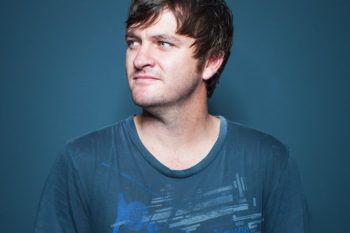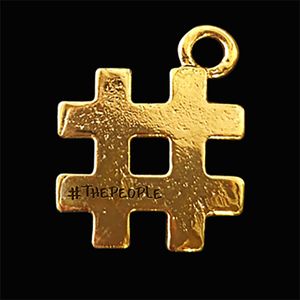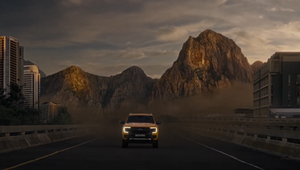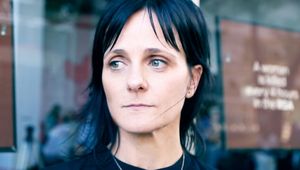
5 Minutes with… Brad Reilly

The executive creative director of Johannesberg’s Net#work BBDO, Brad Reilly, is something of a ‘prodigal son’ to the agency. Having begun his copywriting career there as an excuse to spend his days crafting puns, in 2009 he went exploring other facets of the creative industry. He led a multi-agency unit for Coca-Cola’s 2010 FIFA World Cup project, became CCO at one of South Africa’s fastest-growing agencies and then tried his hand at making products, movies and TV shows. But in 2014 the magnetic force of Net#work BBDO pulled him back in. He’s since been focusing on creating interesting, integrated ideas with deep roots in video content, working to put African creativity at ‘the top’ of the map.
LBB’s Laura Swinton caught up with Brad to chat about his career and delve into his views on optimism, recession and ‘African solutions to African challenges’.
LBB> Where did you grow up and what sort of kid were you?
Brad> The interesting thing about me is that I grew up everywhere but in a very small local area. I have moved in my life over 65 times. I’ve kind of stopped counting now. We moved a lot, but for instance within one suburb we would live in six houses. I went to six schools, which I guess to an extent influenced my outlook on life and how I observe people and, in terms of advertising, can settle into different groups and empathise on them.
And then as a kid growing up I was always the class clown in… let’s say a ‘predominantly charming’ way. But it was always about playing with words, I very much like a pun and that’s been part of my DNA since I could talk, I guess. Bit of a joker, flipping things around all the time and that led to a way with words – I did well in creative writing in particular and I loved the fact that I didn’t have to study for it.
My mother was actually an advertising strategist, so I do like to believe that I’m half-strategist. I was aware of the industry and I was aware of something called a copywriter and that seemed like a job that would allow me to write and get paid. I thought I would go to university to study English but I got there and I was a little bit allergic to the academic studying side of things so I dropped out of university and went to an advertising school called Red and Yellow. It was a brilliant training ground at the time.
LBB> Your first job was at BBDO too, correct?
Brad> I grew up in Jo’berg, studied in Cape Town and went back to Jo’berg to get a job. When I joined the agency we weren’t part of BBDO, we were part of TBWA, and then some time after that we became BBDO.
I met with Mike Schalit [founding partner and CCO at Net#work BBDO] and showed him my book – it turned out he liked a pun as well. He asked me to start the next day. I started at the bottom of the bottom and I was here for 11 years all in all – that’s a time in my life where I got an appetite for creating work that had a cultural impact.
If I’m honest about it, there’s a little bit of megalomania about having a little thought in your head and that thought being able to impact thousands or even millions of people. It’s a pretty cool thing. That’s definitely a seed that was planted in my head due to experience and it germinated and grew through my career.
LBB> What were some of the formative projects you were a part of during that period?
Brad> I’m lucky, I got to spend time working on some iconic South Africa campaigns. In 2008-9 I was asked to head up a collaboration model for Coca-Cola, with the World Cup coming to South Africa. We set up an agency from scratch that was really the first integration model in South Africa, which really excited me. There were four other agencies that were part of that who we worked really closely with – at that time digital, media, activation and PR. So over an 18-month period we worked hand-in-hand to deliver seven campaigns. It was very exciting for me because it highlighted the importance of a big idea over and above executional ideas. I developed a real passion for these big ideas, which felt like a natural evolution from the cultural ideas I’d been talking about.
Then at the end of that period, when the World Cup finished, I was asked to come and head The Jupiter Drawing Room. It had been a boutique that grew massively overnight, winning three huge pieces of business. They established their name with quite traditional media – print and TV. I had gone in with the intention of reforming the creative product from quite a traditional mindset to something more integrated, bigger idea thinking. The biggest client was South Africa’s biggest bank, which wasn’t particularly exciting but within that there were a lot of creative opportunities. We managed to pick up a [Cannes] Lion on that account and get in the book at D&AD. At its core it was a big learning curve for me about the agency model and how it was working at the time. By South African standards it was a big agency – there were 250+ people, a creative department of 65+. I think that highlights some of the classic agency structures I was feeling.
LBB> And where did your career take you after that?
Brad> With a creative partner I had worked with for a number of years, we tried to start our own thing, which was beyond the scope of just advertising. We brought over a woman we’d worked with for a number of years as our business partner and started something called & Anonymous. Again it was an evolution of my career. It was very much a collaboration model, so we would stay as a small hub but build up a network of different collaborators. This was 2012 – I know people are doing that now but I like to think that we were doing it from the beginning.
We were working with filmmakers, graphic designers, you know, your typical creative collaborators… but then we extended that to work with fashion editors, organisational psychologists, educators. Building specific teams for a project.
The outcome of that was quite interesting because we created creative strategies for companies like AB InBev on some of their global brands. We did events. We did something for the BBC. We did a TV show for Diageo. We made a film for ourselves, which won a global short film prize in San Francisco. It was fun, we got to experiment. And then we worked on a project with my old mentor, Mike Schalit at BBDO. My wife was pregnant and he said ‘why don’t you come back?’ I was torn. I’d been doing that for four years and I was really happy with the direction and type of work that we were making, it felt more current, more now, more relevant.
LBB> What was it like coming back? Did it feel like a bit of a homecoming or had the agency changed so much that it felt like a completely different place?
Brad> When I came back in my first role to run Diageo it was strange because I was almost like an appendage to the agency. I wasn’t really immersed in the agency. I actually worked a lot of the time with AMV in London because the account sat there but we ran a lot of the creative out of here.
It was pretty different to how it was when I left. BBDO in South Africa has never been a behemoth – we do grow but we feel quite boutique-y, which I like. The headline was, because I had been there for so long before, ‘the prodigal son returns’. Which was… interesting.
LBB> It sounds like you’ve had some people who have mentored you or supported you. I wonder, what are the pieces of advice in your career that you wish you’d had earlier?
Brad> Let me cast my memory back… I don’t really recall a line of advice, but I’ve got role models. A massive role model for me has been Mike Schalit, who I’ve known for 22 years. I guess it’s almost passive advice he gives. I look at the way he behaves. Even when I left Net#work BBDO I joked that I should have a bracelet that said ‘What Would Mike Do?’. He was always about putting the work first and having an unbridled optimism. It’s a part of who he is and I try to inculcate that optimism into the people I work with now. If we don’t have optimism, we’re going to hate our lives in advertising. If we’re getting battered down all the time, we have to believe that there’s something better just over the hedge or over that next hurdle. We can spend our lives berating everything or we can spend our lives being optimistic.
I go way back with Gerry Human who is over at Ogilvy London now. We were just talking about running an agency. He said: ‘Just worry about the work. In a creative context, don’t get bogged down in all the other issues you have, just focus on the work.’ That’s the thing that pulls you through. That was probably eight years ago and I’ve seen it come true enough. When you get to an ECD level, there are a lot of other things to worry about but it’s about putting that work on a pedestal. And it sounds kind of obvious.
LBB> But when there can be a lot of negativity generated within the industry itself – about the model, about the work – how do you keep hold of that sense of optimism?
Brad> It’s difficult because that optimism isn’t about just rolling over and accepting and moving on. I think you do need to fight for what you believe in.
I’m not going to pretend that everything is rosy out there but I do think that we’re at a really interesting turning point. We’re at an interesting phase of the industry and I’m not sure where it’s going to go. There was a patch there where optimism was difficult, but optimism isn’t about living in la-la land, it’s about finding the nature of what you need to do in some things but to find the opportunity for optimism within a broader mix of things. From a creative person’s point of view, if you get to a point where that optimism is not there you’re going to die and you’re going to leave. And I think that has happened to a lot of creatives around the globe. I think what precipitated an exodus into the freelance economy was that the optimism and the fun, for whatever reason, in some agencies got sucked away.
It can be difficult to find that fun but I’m *optimistic* (laughs) that it’s becoming easier. I think there’s a bit of a groundswell – and look I know that a lot of people are thinking at the moment about the return or rise of creativity and the importance of creativity. So I’m hopeful that that is the case?
LBB> What’s the feeling about the market in South Africa at the moment?
Brad> I’ll talk about it from a BBDO point of view first. We work on quite a few global accounts and their realities affect our realities. We’ve seen budget shrinking and expanding landscapes mean that budgets have to do more at lower cost. But it does depend on sector. Recession is good for some people and bad for other people so we are seeing some clients that are investing and others that are reducing spend, which is challenging.
Over the past eight to 10 years, margins have been getting slimmer and slimmer. One thing we started talking about last year and we’re putting into practice now is how can we develop properties – TV formats, online formats – that we can own and sell onto and license to clients. I think that’s an interesting avenue for us to pursue, just to start to mitigate some of the erosion that is happening on the margins and to create that more regular revenue stream. It means we don’t have a complete reliance on a retainer or project fee.
I think it’s an element of disruption and we’re trying to disrupt ourselves in our own way – other agencies are doing it in their way. R/GA does it on another scale – but it comes to creating products. We’re looking to do that in the entertainment space rather than the hardcore digital space.
LBB> In an age where you get a lot of agencies trying to be everything to everybody, how do you ‘own’ what you’re doing?
Brad> As an agency we do really interesting, integrated ideas, but a lot of it is rooted in video content. I saw a statistic the other day that 70% of Internet traffic was video content, so I’m OK with that. It’s storytelling. In the local market we are very good at that, so it’s about looking at our strengths and building on that.
LBB> Net#work BBDO also works across offices in Nairobi and Lagos – what’s that work like?
Brad> We’ve got a bunch of clients that we’re the hub for the region for – Google, YouTube, Visa, Diageo and PepsiCo. But besides that, our vision for the agency is to ‘turn the world upside-down’.
We’ve got an image of a map that puts Africa at ‘the top’, which is where we need to get to. There are a few layers to it. It’s the belief that across the continent there’s amazing creative inspiration and entrepreneurial inspiration that we can draw from to create distinctive, world-class work. Historically we’ve tried to emulate what’s happening in the US and the UK and in my view we will never be as good as the UK at doing what the UK does. But we can be Africa. We can ‘do’ Africa in a way that is world-class.
My parallel for that would be Thai advertising. I love it. I don’t always understand it. But it’s brilliant because they have a very distinctive voice in how they do things. Sometimes that translates and it travels. I feel like we are dipping our toes into that water but I don’t think we’ve fully found what that ‘thing’ is. I think it’s because so much of what we take as inspiration is from developed communications markets. We might look at a big Nike commercial as a reference but we’re never going to be able to execute that in our market, firstly. And secondly we don’t have Paul Pogba in our commercial so we’re hamstrung by that.
But there’s a whole well of inspiration right here that we need to tap into. I think it’s proven with something like Guinness ‘Made of Black’. That was fresh and world-class and completely inspired by Africa. Other people borrow from it now. Guinness ‘Sapeurs’ was an African story for a European market. You see it in music. Vampire Weekend from the UK have got a completely South African guitar sound in their music. So here, we need to embrace it and make it world-class and unique. Even when it comes to something as one-dimensional as award shows because you’re creating something distinctive that no other region in the world can possibly make. Sometimes that will travel and sometimes it won’t.
LBB> From what I understand of advertising in Kenya and Nigeria, Kenya is really exciting from the point of view of mobile e-commerce and entrepreneurialism and Nigeria is home to awesome music and contemporary art scenes. It must be interesting to learn from and work in those markets.
Brad> It’s amazing but a lot of it in our world of advertising are these unpolished diamonds that you find and nurture.
In Kenya they are doing amazing stuff – they’re coming up with their own solutions. Our mission is to create ‘African solutions to African challenges’. If you look at something like M-Pesa, the payment system there, it’s absolutely ubiquitous. It’s an African solution and it wouldn’t work anywhere else in the world. I do think creativity – in whatever form – is always going to be contextual. And it doesn’t even work in other African markets as it does in Kenya.
So with Diageo, we use that kind of technology to create a campaign for them and a platform that tapped into this payment system and tapped into the connectedness mindset of Kenya.
Nigeria is bristling with energy. It’s a ‘no excuses’ kind of environment. There are close to 200 million people in Nigeria, the vast majority are not particularly well off but there’s no sense of victimisation. There’s a can-do attitude and a belief coming out of Nigeria. It’s incredible. It’s like belief-verging-on-arrogance… which I think total belief needs to be. You go there and there’s a sense that Nigerians are the best people in the world. They’re not telling themselves that; they believe it and live it. We’re starting to see the manifestation of that belief on a global stage. You’ve got rappers like Wizkid in Lagos working with Drake because he’s got his own sound.
I think that’s really important. I do take a lot of inspiration from other creative disciplines, especially music. And it’s been amazing to see the shift that you saw in the music industry in Nigeria and South Africa. Suddenly they started rapping in local languages and infusing their music with local sounds rather than emulating the hip hop stars of America. And now they’ve got their own voice – and the stars in America want to work with these guys because they’re not second-rate knock-offs. I think that’s something we can learn from as a local industry as well.













